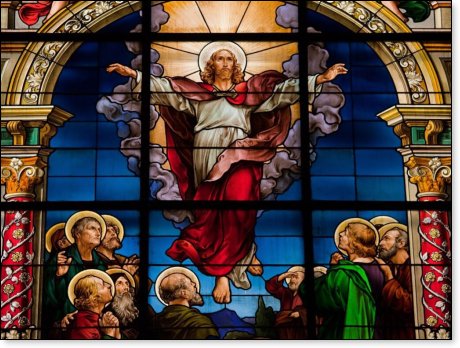
Rev. Mark H. Creech

Not long ago, I finished reading through the entire Bible again. Of course, I finished in the book of Revelation. The experience of reading “The Revelation of Jesus Christ,” as it is referenced in the first verse of the first chapter, was so remarkably moving I decided to park there a while and examine it more carefully. Moreover, I thought it might be beneficial to share with others some of what I gleaned.
Revelation, by the way (and not Revelations, as so many people often erroneously call it), is one book from the Bible where we are promised a blessing for reading, hearing, and obeying (Rev. 1:3). So, if you wish to get the most from this series, you must read the book for yourself.
There is no way to mine all of Revelation’s vast and incredible spiritual treasures in a few short articles. And though it is a book of prophecy, I don’t intend to argue in defense of any end-time views: historic premillennialism, dispensational premillennialism, amillennialism, and postmillennialism. Certainly not because I think those views are unimportant or irrelevant. Anyone who knows something about those eschatological systems will probably detect my bias. But I want to take one great truth from Revelation’s twenty-two chapters, with a few exceptions, not necessarily the primary subject of the particular chapter covered, and expound on it in a devotional way.
I think much of the content of this Bible book is reflective of our own time, and the prudent and wise will adhere to its admonitions and warnings.
The apostle John is the writer of this great book. However, the order that its revelation comes to us is: God gave it to Christ, who sent it by an angel to John to show us coming events. It is a book of many symbols that are alluded to elsewhere in the Bible, which help us understand their representations and meanings. It was written as a general epistle (letter) to “the seven churches in Asia.” Unquestionably, its focus is the person of Jesus Christ, “the One who is, who was, and who is coming” (Rev. 1:4).
This phrasing in Revelation 1:4 is a reference to the deity of Christ. The writers of the New Testament refer to Jesus as God, and they invite us to carefully examine his person to see for ourselves if the claim is legitimate.
The evidence for Christ as the God-man is voluminous. If we search the Scriptures, we find Christ himself made direct claims to be God. The Jews of Jesus’ day fully understood his claims of equality with God the Father (John 10:25-33; John 5:17-18). There were also indirect claims, such as forgiving people of their sins, which the religious leaders of Christ’s day protested because he was taking on an office that belonged to God alone. Jesus claimed the judgment of all humanity had been given to him (John 5:22). People prostrated themselves in worshipping Jesus, and he received their worship.
Jesus declared himself to be the “life” (John 14:6), and he said it was his prerogative to raise the dead (John 6:39, 40, 54; 11:25). There are indeed accounts of others in the Scriptures who raised the dead, but they worked by a delegated power (Acts 9:34) and didn’t claim otherwise. But Christ not only claimed to have this power, but demonstrated it as belonging exclusively to himself (John 10:17, 18). Dare we forget his own resurrection from the dead (Matthew 28:1-19; Mark 16:1-20; Luke 24:1-52; John 20:1-30), which the finest of apologists, scholars, and educators through the centuries have said there is more evidence for than any other event in history?
Sadly, some religious leaders today say believing in Christ’s deity doesn’t matter. They deny Christ’s virgin birth. They contend he was simply a tremendous teacher sent from God. Yet it does make an enormous difference, for both time and eternity. It will mean all the difference between heaven and hell.

In one of my previous pastorates, I was proclaiming the deity of Christ in a Christmas sermon. Afterward, one of the leading members of that church told me, “Mark, I believe that Jesus came from God. I believe Jesus returned to God, but you will never convince me Jesus is God.”
I responded, “Then it is my sad duty to explain that despite your church membership, despite that you’ve been baptized, despite you are a deacon and a Sunday School teacher, you are still in your sins and will be lost forever if you do not accept Jesus for who he is.”
To deny Christ’s deity is to deny him. The entire Christian faith rests on the recognition of Jesus as the Son of God, the second person of The Trinity, in whom “the whole fullness of deity dwells bodily” (Colossians 2:9).
If Jesus is not God, we have no Savior – no one qualified as a sacrificial “lamb without blemish” – a sinless individual whose blood on Calvary’s Cross can atone for the sins of the entire world.
In his book, Evidence that Demands a Verdict, Josh McDowell has written:
In the first century, when people were giving a number of answers about Jesus’ identity, Jesus asked his disciples, ‘But who do you say that I am?’ To which Peter responded, ‘You are the Christ, the Son of the living God.’ (Matthew 16:15, 16). Not everyone accepts Peter’s answer, but no one should avoid Jesus’ question.
There is no escaping it. Jesus was who he said he was, or he was the most narcissistic, maniacal liar who ever lived. There is no middle ground. Christ didn’t leave that open to us, and he didn’t intend it to be any other way.

We have only two options. We either accept him as Savior and Lord, or we reject him. We either believe in him or disbelieve in him. We either say he is true, or we call him a liar.
One other reality that cannot be ignored is noted in the first chapter of Revelation. Jesus is the One “who is coming” (v. 4).
John adds, “Look! He is coming with the clouds, and every eye will see him, including those who pierced him. And all the families of the earth will mourn over him. This is certain. Amen” (Revelation 1:7).
Jesus is coming again. When he comes the second time, he will not be mild and meek as he was the first. He will come as King and Judge when he returns. Many will be prepared for that day and glad because they turned away from their sins and trusted in Christ for salvation against the day of God’s wrath. Others from every nation, however, will not be ready because they ignored and scorned him. Thus, they will mourn his appearance. They will see that he is indeed the Sovereign One, the One whose grace they’ve disregarded, and now there is no hope for them in the life to come.
Which will it be for you?
If everything Jesus said about himself is true, and the evidence for it is overwhelming, it stands to reason everything he said about his second coming is also true.
Jesus said we should stay awake, watch, and be ready for his coming again. (Matthew 24:42; 25:13).
Jesus is “the One who is, who was, and who is coming” (v. 4). He’s coming back, and it appears from many of the signs foretold in Bible prophecy it may be very soon.
© Rev. Mark H. CreechThe views expressed by RenewAmerica columnists are their own and do not necessarily reflect the position of RenewAmerica or its affiliates.




















